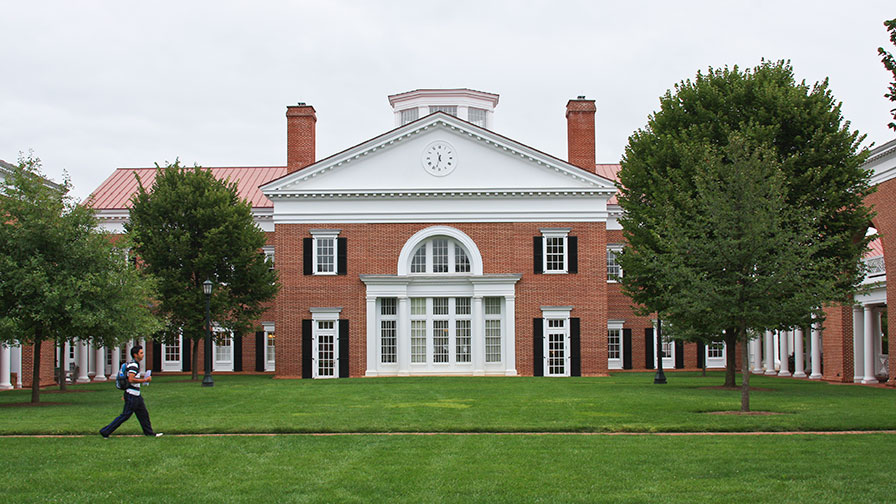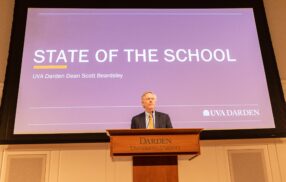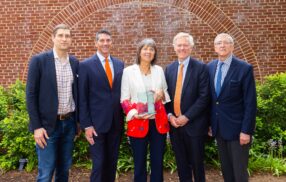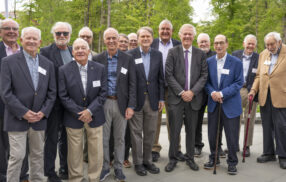
Annual Sustainability Research Conference Inspires Collaboration and Shares Solutions
The Alliance for Research on Corporate Sustainability (ARCS), housed at the University of Virginia Darden School of Business, held its fifth annual research conference at the Berkeley-Haas School of Business on Monday, 29 April through Wednesday, 1 May. Participants also attended the second annual ARCS Forum, a pre-conference, one-day event to strengthen the connection between pedagogy and practice.
Ideas related to partnerships between corporate and non-government organizations (NGOs), stakeholder management and the development of strategies to fight climate change emerged from the conference.
Neil Hawkins, vice president for sustainability and global environmental health and safety at The Dow Chemical Company, gave the keynote address along with Glenn Pritchett, chief external affairs officer for The Nature Conservancy. They talked about their long-term partnership aimed at protecting ecosystems.
“It is a lot of hard work, but through our partnership, we are meeting goals that align with both of our organizations,” Hawkins said of his company’s work to incorporate the economic value of nature into strategic decision-making. Testing for new scientific tools is underway at three pilot sites in North America, Latin America and Asia.
“Global companies that strategically manage the value of ecosystem services will have a competitive advantage,” Hawkins added.
Professor Michael Lenox, Darden associate dean and president of ARCS, was encouraged to hear about the work that is happening between business practitioners and their NGO and academic partners.
“There was also quite a bit of engagement about stakeholder management and how to address the needs of employees, shareholders and others, while meeting sustainability goals,” Lenox said. “Dow’s partnership with The Nature Conservancy allows them to satisfy various stakeholders, which include employees and customers wanting to see the company’s sustainability vision in action.”
The group also discussed the implications and challenges of California’s proposed cap and trade system, a market-based solution for mitigating greenhouse gas emissions associated with climate change. Speaker Severin Borenstein, director of the University of California Energy Institute, was optimistic about the state of California achieving its goal to power 33 percent of its electrical load with renewable energy by 2020. However, he noted that major challenges remain for cap and trade in California. The state has taken lessons from the European Union’s emissions trading system, particularly by establishing a floor on the price of carbon dioxide emissions to help provide price certainty.
“No matter how robust a system we design to reduce carbon emissions, politics will be critical. And we must increase our spending on incentivizing and spreading technology innovation,” warned Borenstein.
Professors and doctoral students in attendance presented academic research papers on topics including sustainable operations, firms’ voluntary disclosure of environmental impacts, sustainable finance and alignment between research results and corporate sustainability practices. Many scholars addressed the inextricable link between government and firm policies.
Peter Senge, author of The Fifth Discipline, a seminal book on systems thinking used in Darden’s MBA program, led a discussion with corporate sustainability strategy leaders from Autodesk, Clif Bar and SAP, about best practices and challenges to inspiring organizational change for sustainability.
A major challenge is reviewing a company’s entire supply chain to understand social and environmental impacts. According to Senge, it takes the entire organization to be on board with the process. Senge noted the passion of those involved in change management for sustainability, and the societal impacts of their efforts in product innovation and supply chain transformation, especially in the areas of water and agriculture.
“Most change management efforts are not stories people tell their grandchildren. These are,” he said.
“Organizations must have a vision and help their stakeholders share that vision,” said Lenox, who reflected on Senge’s talk. “The challenge is communication across the entire value chain. It’s very difficult, given the tremendous pressure for transparency and the speed of change.”
A prime example of why companies must have an intimate knowledge of their supply chains unfolded recently when two manufacturing plants in Asia collapsed, one from structural instability and the other from a fire. Both resulted in the loss of many lives.
“Some companies take the view that what happened in Bangladesh is an issue of risk management and the need to protect brands,” said Lenox. “Others look at it from the stand point of pure transparency and the importance of understanding what really happens at all levels of their business. These factors are also critical elements of a successful business strategy.”
Lenox, with colleagues from Harvard Business School, Tuck School of Business at Dartmouth and other universities, came up with the idea of creating a hub for thought leadership on sustainability, and co-founded ARCS in 2009. During the conference, ARCS was pleased to welcome another member institution to the fold. The University of California, Los Angeles joined the alliance, cementing a West Coast presence that also includes the Haas School of Business.
Collaboration among universities was another strong thread throughout the event’s proceedings.
“Our member universities have scholars in sustainability and centers to help promote and support their research. ARCS brings us all together so that we can share best practices,” said Erika Herz, associate director of sustainability programs at Darden and managing director for ARCS.
According to Herz, sustainability course work and career roles are of increasing interest to students. Through ARCS, academics are able to meet, collaborate and learn how to address new academic needs.
“The ARCS conference fills a void,” said Herz. “There wasn’t anything like it before, but now that these scholars can find each other, they are able to build relationships and collaborations that lead to new knowledge and meaningful career successes.”
Professor Andrew King of Dartmouth College served as chair for this year’s pre-conference forum and he spoke about the wide gulf between professors and practitioners and the perils of too few opportunities for these groups to interact.
Thanks to ARCS, the gulf is closing.
The conference and Forum were sponsored by the Haas Center for Responsible Business, with generous sponsorship from the Dow Chemical Company and California Management Review.
The University of Virginia Darden School of Business prepares responsible global leaders through unparalleled transformational learning experiences. Darden’s graduate degree programs (MBA, MSBA and Ph.D.) and Executive Education & Lifelong Learning programs offered by the Darden School Foundation set the stage for a lifetime of career advancement and impact. Darden’s top-ranked faculty, renowned for teaching excellence, inspires and shapes modern business leadership worldwide through research, thought leadership and business publishing. Darden has Grounds in Charlottesville, Virginia, and the Washington, D.C., area and a global community that includes 18,000 alumni in 90 countries. Darden was established in 1955 at the University of Virginia, a top public university founded by Thomas Jefferson in 1819 in Charlottesville, Virginia.
Press Contact
Molly Mitchell
Associate Director of Content Marketing and Social Media
Darden School of Business
University of Virginia
MitchellM@darden.virginia.edu





